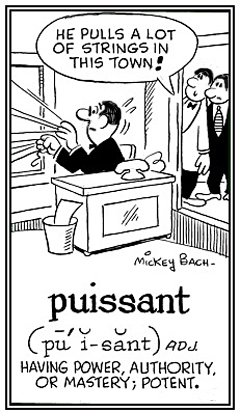poten-, pot-, poss-, -potent, -potence, -potency, -potential +
(Latin: power, strength, ability, able; having authority over; rule over, command of)
2. Concerning how something is possible but not yet verified: James provided potentially useful information that had yet to be scrutinised.
3. Pertaining to how the inherent ability for growth or development might come into being: A baby is potentially brilliant, and might grow up to be a genius!
A potentiometer is a device that measures electromotive force or potential difference by comparing a part of the voltage to be measured against a known electromotive force.
2. A three-terminal resistor with an adjustable center connection: A potentiometer is widely used for volume control in radio and television receivers.
2. Physical force or strength: Jerry needed a lot of power to hit the baseball far enough into the field in order for a home run!
3. Control and influence over other people and their actions: In her career, Jill reached a high position with lots of power and influence.
4. The political control of a country, exercised by its government or leader: The people wanted to overthrow the present government because they were exercising unfair and brutal power over the citizens.
5. The authority to act or to do something according to a law or rule: Mr. Smith had a debt problem, and the bank said that it was within his power to resolve the unfavourable situation on his bank account.
Police have the power to arrest criminals.
6. A country that has military or economic resources and is considered to have political influence over other countries: There have always been nations whose power has been used to have great impact and control over smaller and weaker nations.
7. The ability to influence people's judgments or emotions: Mr. T. used his rhetorical power to move and sway the masses of people to accept and have trust in his views as being the truth!
8. A measure of the rate of doing work or transferring energy: Power is usually expressed in terms of "wattage" or "horsepower".
9 Energy produced by electricity or fuel: Power is generated when a motor uses electrical energy or fuel instead of relying on manual labor.
10. Etymology: from Anglo-French pouair, Old French povoir, noun use of the infinitive in Old French, "to be able" from earlier podir, from Latin potis, "powerful".
It does not necessarily follow that the higher the coefficient the better because above a certain wind speed excess energy must be wasted to avoid undue stress on the system.
2. Regarding the exertion of great physical or mental strength: Jane's dog is very big and powerful.
Jack flexed his powerful muscles to show his girlfriend how strong he was.
2. To influence beforehand against or in favor of someone or something; to prejudice: Joan's mother was quite biased and prepossessed of her daughter being the most beautiful girl in her class at school.
3. To impress favorably in advance or beforehand: Seeing the young and beautiful violist on stage prepossessed the audience even before she started playing!
2. An opinion formed beforehand without adequate evidence: Mrs. Smart was absorbed with the prepossession that she wasn't going to like her new job even before she met her colleagues and boss, who were actually very nice people!
2. Concerning the quality of something which has great influence or superiority: The prepotent magazine in the country was noted for its fantastic photos throughout the world!
3. In genetics, descriptive of the condition of dominance in an animal, a person, or a plant: Peter's father evidently was the prepotent parent of the two, because Peter had brown eyes like his father and not blue eyes like his mother.
2. Power, might, or force: The puissance of the mayor with his new local taxes was not appreciated by the citizens of the city.
3. Etymology: from late Middle-English, "great power, great influence"; from Old French, "power"; from puissant, "having power".
Although the cartoon is presenting an adjective, it is used here because it helps to understand this noun form.



